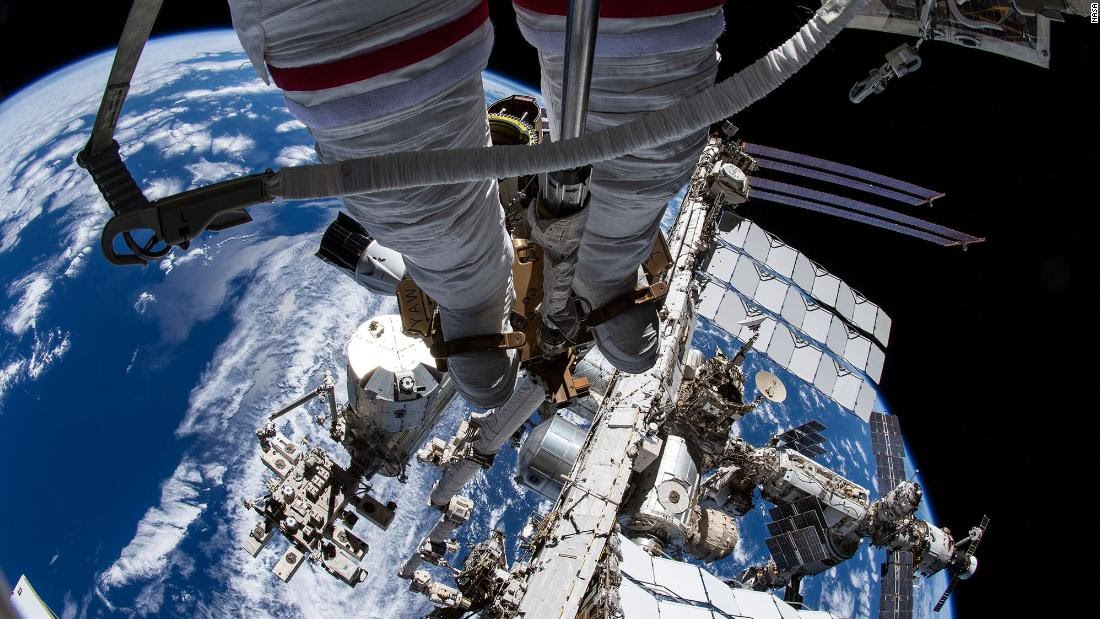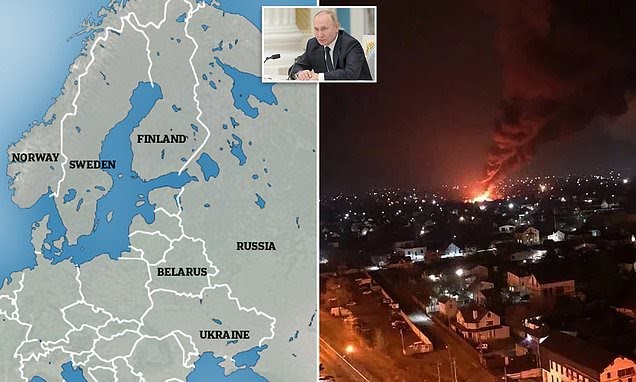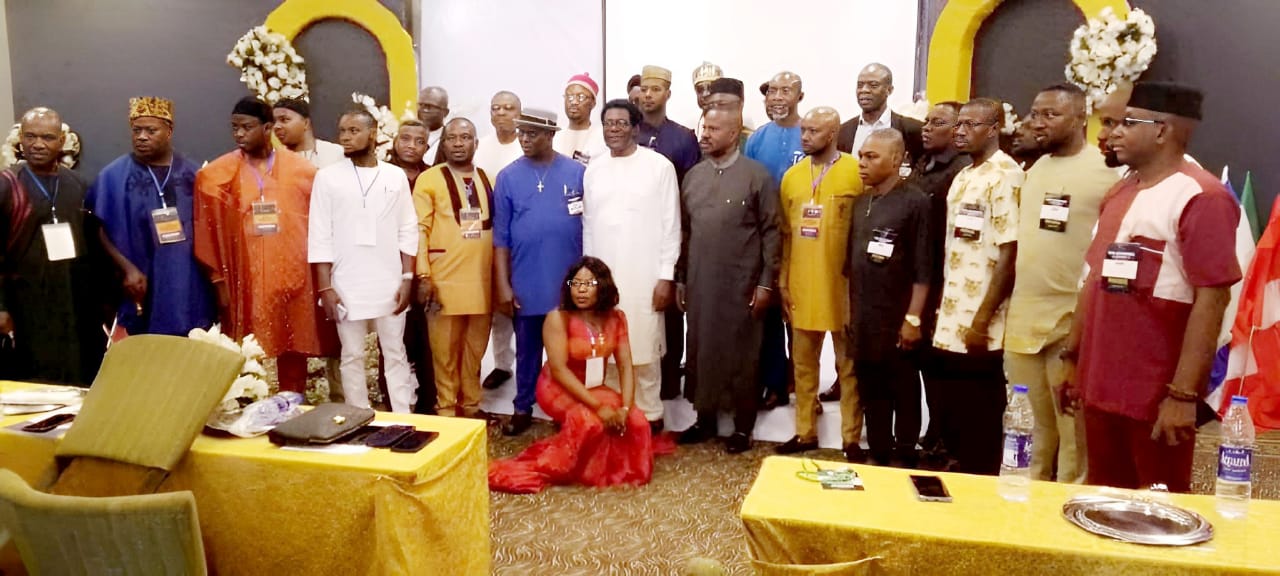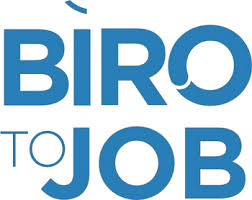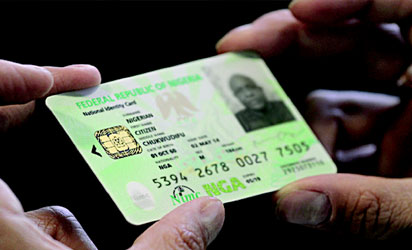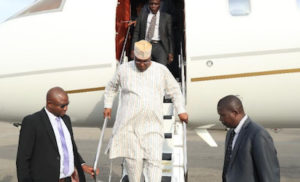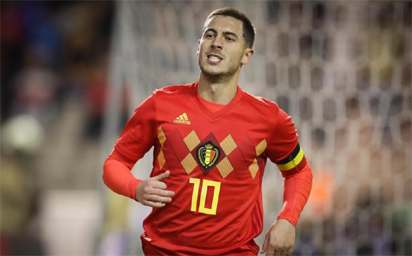EXPLAINER: Why Did Russia Invade Ukraine? – usnews.com
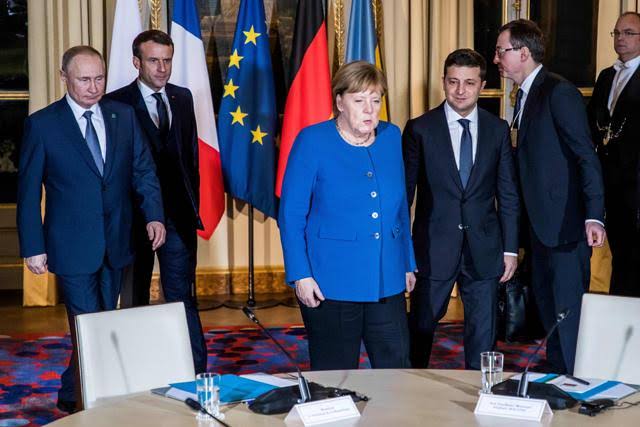
Experts say the cause of the military conflict can be tied to a complicated history, Russia’s tensions with NATO and the ambitions of Vladimir Putin.
By Elliott Davis Jr. Staff Writer
Predictions of a full-scale Russian invasion of Ukraine came true in the early morning hours of Feb. 24.
Russia had amassed up to 190,000 troops – according to reports from the U.S. – on Ukraine’s borders over the course of many months. The buildup of forces around Russia’s neighbor and former Soviet Union state started in late 2021 and escalated earlier this year.
Prior to the invasion, Russian President Vladimir Putin recognized the Russian-backed breakaway regions of Donetsk and Luhansk, both located in the disputed Donbas area, as “independent” people’s republics and ordered so-called “peacekeeping” troops into those areas.
What started as a situation that was concerning but surrounded by hopes for dialogue and diplomacy has evolved into what the Ukrainian foreign minister described as the “most blatant act of aggression in Europe since” World War II.
While what happens next is impossible to predict, experts do have insight on the origins of the conflict. They say the roots of the tension can be tied to some combination of the complicated history between the two countries, Russia’s ongoing tensions with North Atlantic Treaty Organization and the ambitions of one man, Putin.
What is the history between Ukraine and Russia?
Russia and Ukraine have what either side might describe as a common or complicated legacy that dates back a thousand years. In the last century, Ukraine, known as the breadbasket of Europe, was one of the most populous and powerful republics in the former USSR as well as an agricultural staple until it declared independence in 1991, according to the Council on Foreign Relations. But Russia has since kept a close eye on its neighbor to the West, while Ukrainians have found their independence to be tumultuous at times, with periods of protests and government corruption.
Ukraine’s ambitions to align itself more with Western countries – including its publicly stated interest in joining NATO, which itself was founded at least in part to deter Soviet expansion – has been met with aggression from Russia, the council notes. Tensions came to a head in 2014 after Ukrainians ousted a Russia-aligned president. Russia – under the dubious claim of protecting ethnic Russians and Russian-speakers from Ukrainian persecution – annexed the Crimea region of Ukraine in a move widely condemned by the international community.
At about the same time, Russia fomented dissension in the Donbas area of eastern Ukraine, backing a separatist movement in the regions of Donetsk and Luhansk that resulted in armed conflict. The regions declared independence as both sides dug in for a protracted standoff. The conflict between the two countries has persisted since, with at least 14,000 people dying, according to the council.
When did the current conflict between Russia and Ukraine begin?
Russia started growing its military presence around Ukraine – including in Belarus, a close Russia ally to the north of Ukraine – in late 2021 under various pretenses while remaining vague on its intentions. By December, tens of thousands of Russian troops were hovering on the border, virtually surrounding the country and stoking tensions that led to a call between Putin and U.S. President Joe Biden.
Fears escalated earlier this year as the number of Russian forces surrounding Ukraine increased. Biden and Putin have since talked again, U.N. Security Council sessions have been called to address the crisis, and numerous leaders from NATO, the U.S. and other countries have called on Russia to de-escalate or face retaliation in some form. The most recent estimates – prior to the invasion – put the number of Russian troops on the border at close to 200,000.
What does Russia want when it comes to Ukraine?
A principal demand of Russia is to prevent Ukraine from joining NATO, a military alliance between 28 European countries and two North American countries dedicated to preserving peace and security in the North Atlantic area. The former Soviet state is one of just a few countries in Eastern Europe that aren’t members of the alliance. The Kremlin in general views NATO expansion as a “fundamental concern,” according to a translated readout of a Jan. 28 call between Putin and French President Emmanuel Macron.
It’s noteworthy, however, that NATO likely has “no intention right now” to admit Ukraine to the organization, says William Pomeranz, the acting director of the Kennan Institute at the Wilson Center, a non-partisan policy forum for global issues.
“I think NATO, and the invitation for Ukraine to join NATO at some point in the future, is simply just a pretext to potentially invade Ukraine,” he says, referring to Russia. “Ukraine is not a member of NATO, it doesn’t have any of the NATO guarantees, and so there is no hint that Ukraine will become a member of NATO soon.”
Putin, specifically, does not want Ukraine to join NATO “not because he has some principled disagreement related to the rule of law or something, it’s because he has a might makes right model,” adds Bradley Bowman, the senior director of the Center on Military and Political Power at the Foundation for Defense of Democracies, a non-partisan research institute focused on national security and foreign policy.
“He believes, ‘Hey, Ukraine, I’m more powerful than you, and because I’m more powerful than you, Ukraine, I can tell you what to do and with whom to associate,’” Bowman says.
Beyond the concern around NATO and other demands related to weapons and transparency, Russia’s nature of expansion is also at play when it comes to Ukraine. Some Russians, Putin included, remain aggrieved by the collapse of the USSR, and feel Russia has a claim to the former Soviet republic.
“The imperialistic policy of the Russian Federation requires from us and all the allies complex activities and complex deterrence and defense,” U.S. Secretary of Defense Lloyd Austin said during a Feb. 18 news conference.
What does Vladimir Putin want out of Ukraine?
The demands of the Russian government are inseparable from those of its authoritarian leader. While analysts are quick to say that they cannot read Putin’s mind – Biden himself admitted as much during remarks on Feb. 18 – they note his broad ambitions, particularly those tied to his nostalgia for the territorial integrity of the USSR, that have been made clear by his actions.
“We know that Putin views the collapse of the Soviet Union as a disaster,” Bowman says. “We know he resents the success of NATO. We know that he genuinely reviles the expansion of NATO eastward. We know that he has an eye on history, he’s getting older, he is mindful of how he’s going to look in history books and he sees himself as kind of a neo-czar who would like to reconstitute as much of the Soviet Union as possible.”
Ukraine, in particular, is a “critical element” of this ambition, Bowman adds. Putin has a history of invading and occupying countries that approach NATO membership. Russian armies invaded the former Soviet state of Georgia in 2008 as that country was pursuing membership in the alliance. They briefly pressured the capital Tbilisi before withdrawing to separatist regions they still occupy today. The 2014 Crimea annexation is another example, Bowman notes, and Putin said on Feb. 22 that he wants the world to recognize that territory as rightfully Russian. He rationalized in an essay last year that a common history and culture – which Ukrainians dispute – entitled Russia to exert its influence there.
“I think Ukraine has always been a sore spot for Vladimir Putin,” Pomeranz says. “He does not recognize its independence and its right to be a country, as he noted in his long article on Ukraine, where he said that, basically, Ukraine and Russia are one people in one country. There is this long felt resentment about Ukrainian independence and the fact that the Soviet Union just let Ukraine go away, as it were. So I think he wants to end that independence.”
The Russian president, however, might not have predicted the type of strong response from the international community he has seen to the buildup on the Ukraine border. Bowman says because of this, Putin “is the most persuasive billboard possible for the value of NATO membership.”
“What we’ve seen from President Putin is basically to precipitate everything he says he wants to prevent,” Secretary of State Antony Blinken said during a Feb. 16 “Morning Joe” appearance on MSNBC. “He says he wants NATO further away from Russia. NATO has only gotten more united, more solidified as a result of the threat of Russian aggression, and of course, for defensive reasons, is moving more forces closer to Russia.”
Why is Russia invading Ukraine now?
It all could come down to Russia’s resources at the moment, Pomeranz says. It might be the “most opportune time” from Putin’s perspective, he adds, because the country has $600 billion in foreign currency reserves and has already put significant resources into reconstructing Russia’s army.
“I think Vladimir Putin thinks this is the best time for him to right what he perceives as a great wrong and reverse Ukrainian independence and sovereignty,” says Pomeranz of the Wilson Center.
Putin likely also views the West – including the U.S., specifically – as weak, Pomeranz adds, which could impact how much help he thinks Ukraine will actually get. Bowman echoes this sentiment and points to how the U.S. handled pulling troops out of Afghanistan in August.
“I don’t know how he could have read that as anything other than American weakness,” says Bowman, who served as an adviser to Republican senators for years. “I think he wondered whether, frankly, the Biden administration would be as weak as the Obama administration was in dealing with aggression toward Ukraine.”
Biden administration officials would beg to differ on the U.S. response. Blinken, during a Feb. 23 appearance on “CBS Evening News” prior to reports of the invasion, said further Russian aggression in Ukraine would lead to “a price that Vladimir Putin and Russia will pay for a long, long time.”
“We’re not standing by and watching,” Blinken said. “To the contrary, we’ve spent months building with allies and partners these very significant consequences for Russia.”
Other reasons for action now could be at play for Putin. A combination of factors – from the impact of the COVID-19 pandemic to Ukrainian President Volodymyr Zelenskyy’s lack of political experience – have led to somewhat of a “perfect storm” for the Russian leader to act now, says Kimberly St. Julian-Varnon, a presidential doctoral fellow at the University of Pennsylvania.
“I think it’s his magnum opus,” she says. “I think this is his crowning achievement of whatever Putinism is.”
How are the U.S. and other countries responding to Russia’s invasion?
The North Atlantic Council, the political decision-making arm of NATO, held an emergency meeting on Feb. 24 at which it activated its defense plans, which include the NATO Response Force. Biden had said before Russia’s attack that he would be sending more U.S. troops to Eastern Europe to defend NATO allies such as Poland but has repeatedly stated he will not be sending U.S. troops into Ukraine.
Some countries had already responded to Putin’s actions related to the Donbas, which the U.S. called the “beginning of an invasion.”
Biden on Feb. 22 announced a series of sanctions against Russian financial institutions and the country’s elites. That followed an executive order he issued prohibiting new investment, trade and financing by U.S. persons to, from or in Donetsk and Luhansk. U.K. Prime Minister Boris Johnson announced his own country’s sanctions on Feb. 22, targeted against Russian banks and billionaires, the BBC reported.
The U.S. president also ordered sanctions against the Russian-built Nord Stream 2 natural gas pipeline company and its corporate officers on Feb. 23. The controversial project, which runs from Russia through Europe, is not yet online but is pivotal to both Moscow and Western Europe, which is becoming increasingly dependent on Russian supply to fulfill its growing energy needs. German Chancellor Olaf Scholz had already said before Biden’s sanctions announcement that his country would halt certification of the pipeline due to Russia’s actions.
Biden promised in a statement late on Feb. 23 that he would announce “further consequences the United States and our Allies and partners will impose on Russia for this needless act of aggression against Ukraine and global peace and security.”
However the world responds, St. Julian-Varnon hopes that domestic political discourse doesn’t distract from what Ukraine really needs.
She adds, “We have to focus on what we – and what the United States federal government, our armed forces – what can we do to provide material aid to the Ukrainian armed forces, but also to help prepare for the migration crisis and the humanitarian crisis that will follow this.”
